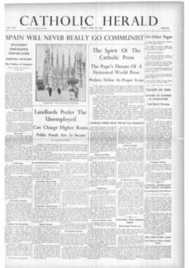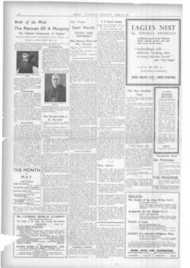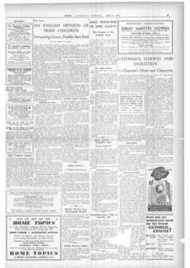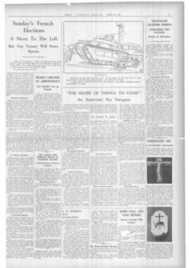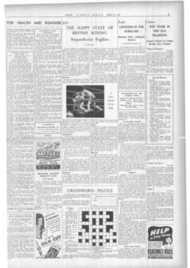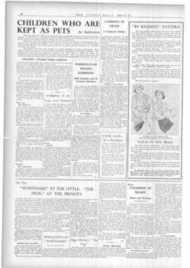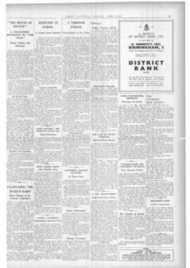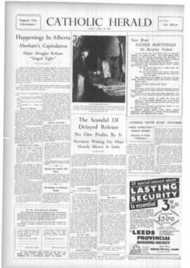Page 6, 24th April 1936
Page 6
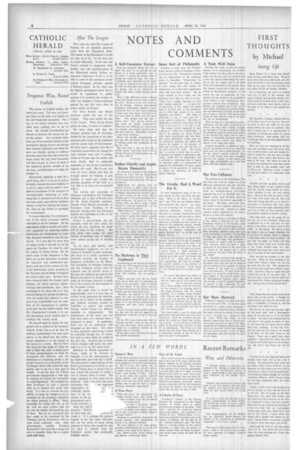
Report an error
Noticed an error on this page?If you've noticed an error in this article please click here to report it.
Tags
Share
Related articles
CATHOLIC HERALD
FRIDAY, APRIL 24, 1936.
HEAD OFFICE: 110-111, Fleet St., London, E.C.4. (Central 6264-5) BRANCH OFFICES : 11, Albert Square,
Manchester. (Blackfriars 1067) 30, Manchester St., Liverpool.
(Central 2461) 6, Vernon St., Leeds.
(Central 24891) 32, Clayton St. West, Newcastle-on Tyne. (Central 27993)
Twopence Wise, Pound Foolish
The poorer an English family, the more tea it uses. The very, very poor, say those on the dole, live largely on tea and bread and margarine. For a day or two before dole-day they very often have nothing else to eat or drink. Mr. Neville Chamberlain has chosen to increase the tea-tax by 2d. on the pound. At a moment when four out of five married citizens of the income-tax paying classes are having their burdens lightened, and when the poor are already paying in indirect taxation more than they have done for many years, the very poor housewife will have to pay Id. more on each of the numerous quarter pounds of tea she buys, and half-pence are what she budgets in.
Statistically speaking it may be a small thing, but it is an act of callous brutality towards the most helpless. It is all of a piece with its author's complacent acceptance of the prospect of unemployment remaining at something like its present level for at least ten years more, and with his stubborn refusal to find for feeding the hungry the sums he has found so promptly for re-armament.
It is more than that. It is representative of the whole economic outlook embodied in his five budgets. He has consistently tried to remedy our industrial stagnation by enforcing further restrictions on consumption in order that financial orthodoxy may be preserved. It is true that he never tires of taking credit to himself (as he did again on Tuesday) for what he calls his policy of cheap money, but the main cause of this cheapness is that there are so few borrowers of money for industrial and commercial purposes, and one of the reasons for this is the deflationary policy pursued by the Treasury and the Bank of England for sixteen years past. Incomes have been reduced while the charges upon industry for social services, administration and armaments have been continued at or above the level they attained during the period of inflation, with the result that industry is cornparatively unprofitable and the numbers of the unemployed is continuously near the two million mark. And Mr. Chamberlain's remedy is to curtail purchasing power further and so continue the vicious circle.
He himself must in charity be supposed to be so soaked in the monetary outlook of the City as to be, like the ordinary professional City man quite sincere in his belief that this professional orthodoxy is to the benefit of the nation as a whole. But for those who have not this angle of vision the time is fully ripe, after so many years of mass unemployment, to resist the assumption that deflation and the restriction of consuming power is the proper function of a Chancellor of the Exchequer faced with industrial stagnation, and to ask for a new type of budget. In pre-war days the Liberal government inaugurated a new type by making the budget the instrument of social legislation. This method has been developed on such a gigantic scale as to menace our social wellbeing. It is time to consider the possibility of using the budget as an instrument for the monetary expansion for which industrY is pniing. Many proposals for doing this are in the air, and we must confess that we are not yet wholly convinced by any of them. But we are convinced that they ought to be examined by the Treasury and by Parliament with an open mind, especially since other governments, notably President Roosevelt's, have had the courage not only to examine them but to experiment with them.
blog comments powered by Disqus


